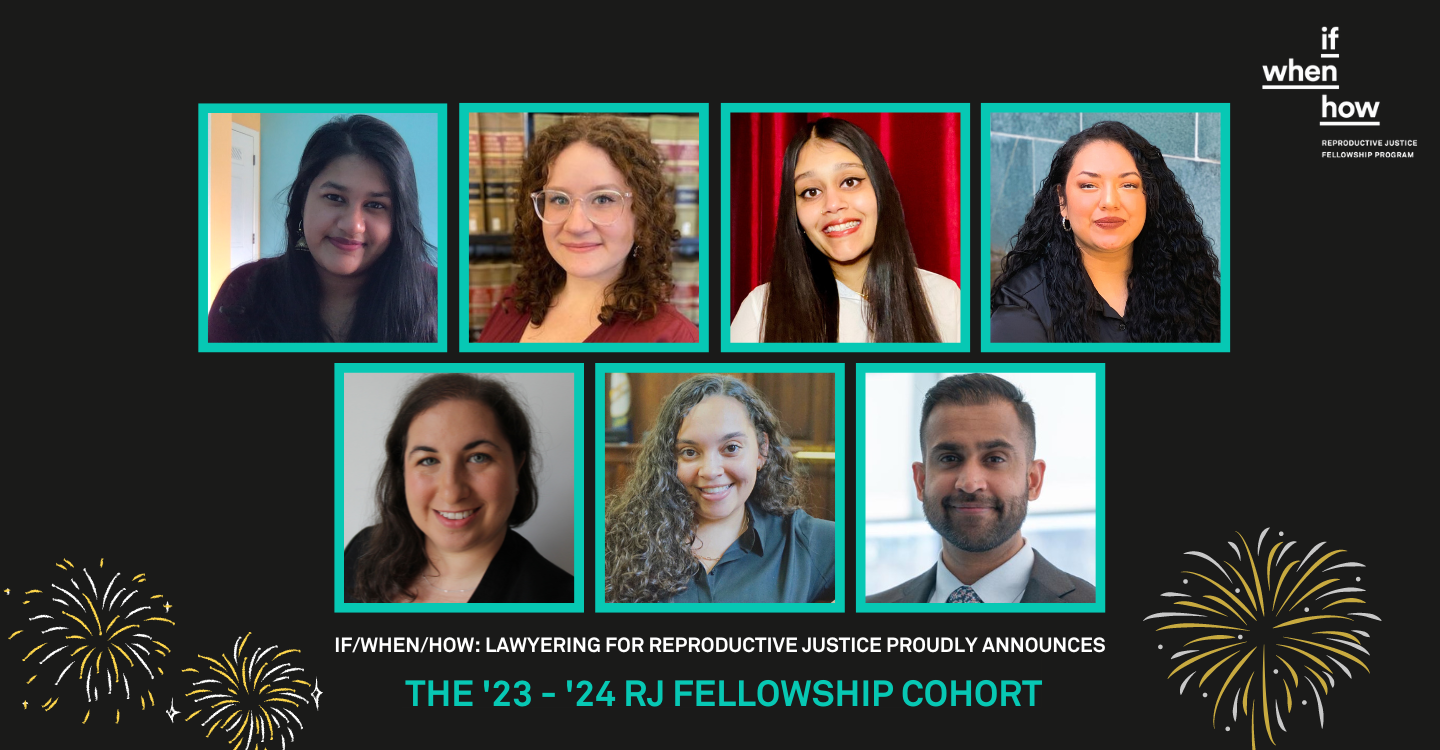By If/When/How
If/When/How is excited to announce our fourteenth Reproductive Justice Fellowship Program (RJFP) cohort. Join us in celebrating seven recent law school graduates and welcoming them to a community of, now, 102 lawyers who have launched their careers with our one-of-a-kind legal fellowship.
During this year-long journey, If/When/How Fellows will help build power at placement organizations that are working at the intersection of multiple movements to realize reproductive justice for all people. The impact goes beyond their Fellowship year. After graduating from the program, 80 percent of Fellow alumni go on to work in repro or an allied social justice organization.
In this post-Dobbs legal landscape, it is vital to support new lawyers as they hone their skills and plug into direct service and proactive advocacy efforts at the state and federal level. We’re witnessing and living through an escalation of compounding attacks and criminalization not only targeting abortion but trans and gender-affirming care, racial justice organizing, public education, and resistance to environmental destruction. Legal know-how combined with deeply held repro justice principles can be tools for upending the status quo and building new structures that recognize everyone’s bodily autonomy and dignity.
Those who are most impacted by reproductive oppression must be leading the movement to lawyer for reproductive justice. By design, the legal field often excludes and marginalizes the people and communities most harmed by our current systems. Among U.S. law students admitted in 2021, nearly 60 percent were white. Women make up a little over half of that class. However, gender parity disappears and racial disparities increase when we look at who’s actually practicing law: 62 percent of lawyers are men, and 88 percent are white. According to NALP’s 2022 report findings, just 10 percent of lawyers employed by firms in the NALP Directory of Legal Employers are women of color, and 4 percent are openly lesbian, gay, bisexual, or transgender people.
In contrast: About 66 percent of If/When/How’s fourteen Fellow cohorts identify as people of color, and 41 percent identify as lesbian, gay, bisexual, transgender, or queer folks, and 25 percent come from low-income backgrounds. The RJ Fellowship program values lived experiences and prioritizes selecting candidates who belong to communities encountering the brunt of injustice.
The impact that RJ Fellows make is clear. From championing the EACH Act and Equality Act with an attention to mobilizing and centering young people, to contributing to a white paper on reparations and reproductive justice, to organizing and convening a Celebrate and Honor Black Women event with over 100 attendees, and showing up in solidarity for calls to decriminalize sex work and stopping police militarization, our Fellows have done incredible work helping move us closer to the world we all need and deserve.
Please join us in congratulating these seven new RJ Fellows and the placement organizations selected to participate in the 2023-24 cohort.
- Maya Arigala (she/her), George Washington University Law School, 2023
RJ-HIV Fellow at Positive Women’s Network-USA
- Mackenzie Darling (she/her), Northeastern University School of Law, 2022
RJ Federal Fellow at Physicians for Reproductive Health
- Deepali Gill (she/her), Golden Gate University School of Law, 2023
RJ State Fellow at Illinois Contraceptive Access Now (ICAN!)
- Grabiela Hernandez (she/her/ella), Emory University School of Law, 2023
RJ-HIV Fellow at SisterLove, Inc.
- Cassandra Pilla (she/her), CUNY School of Law at Queens College, 2023
RJ State Fellow at Elephant Circle
- Rachel Utz (she/her), Louis D. Brandeis School of Law at University of Louisville, 2023
RJ State Fellow at SPARK Reproductive Justice NOW!
- Hirsha Venkataraman (he/him), CUNY School of Law at Queens College, 2023
RJ Federal Fellow at Women’s Law Project
To shout out these Fellows and all they do, follow us on Facebook, on Twitter and on Instagram, and on our blog.
Help continue this change-making, culture-shifting work with a donation. Then tell your friends and family why you think it’s so important to support the reproductive justice movement by demanding a more diverse, more representative legal field.
We could not do this work without the generous funding from our foundation partners, the continued collaboration with the Women and the Law Program at American University Washington College of Law, the unflagging support from our allies and community, and the energy and enthusiasm from our student and legal professional members. Thank you!
